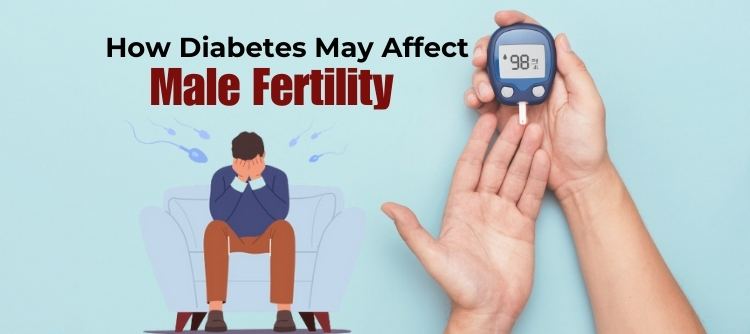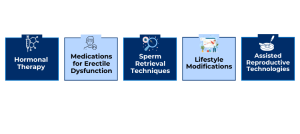How Diabetes May Affect Male Fertility

Diabetes, a chronic condition that affects how the body processes glucose, can have far-reaching effects on overall health, including reproductive health. Many men with diabetes experience challenges related to male infertility, which can significantly impact their ability to conceive. Understanding how diabetes affects male fertility is essential for those who are concerned about their reproductive health. In this blog, we will explore the relationship between diabetes and male infertility, the underlying mechanisms involved, and the available treatment options.
Understanding the Link Between Diabetes and Male Infertility
Diabetes can lead to hormonal imbalances, nerve damage, and reduced blood flow, all of which can affect various aspects of male fertility. Men with diabetes may experience lower testosterone levels, erectile dysfunction, and decreased sperm production and quality. These factors can significantly hinder a couple’s ability to conceive.
Hormonal Imbalances
Men with diabetes often experience hormonal changes due to fluctuations in insulin levels. Insulin resistance, common in type 2 diabetes, can lead to elevated levels of insulin in the bloodstream, which may interfere with the production of testosterone. Low testosterone levels can result in decreased libido, reduced sperm production, and impaired sexual function, making it more challenging for men to conceive.
Erectile Dysfunction
Erectile dysfunction (ED) is a common issue for men with diabetes. The condition occurs when blood flow to the penis is inadequate, preventing an erection. Diabetic neuropathy, a complication of diabetes that affects nerve function, can also contribute to ED. Men experiencing erectile dysfunction should consult a healthcare provider to explore treatment options, as this condition can further complicate efforts to conceive.
Sperm Production and Quality
Diabetes can negatively impact sperm production and quality. Research has shown that men with diabetes may have lower sperm counts, reduced sperm motility, and abnormal sperm morphology. These factors can decrease the chances of successful fertilization. Additionally, oxidative stress—an imbalance between free radicals and antioxidants in the body—can damage sperm DNA, further impairing fertility.
How Diabetes Impacts Male Reproductive Health
In addition to the direct effects on sperm production and quality, diabetes can impact male reproductive health in other ways:
1. Metabolic Syndrome
Men with diabetes often face the risk of metabolic syndrome, a cluster of conditions that includes obesity, high blood pressure, and abnormal cholesterol levels. Metabolic syndrome can lead to further complications, including reduced fertility. The interplay between these conditions can create a challenging environment for conception.
2. Psychological Factors
The emotional toll of living with a chronic condition like diabetes can also affect fertility. Stress, anxiety, and depression can result from the daily management of diabetes and the impact on relationships. These psychological factors can influence libido and sexual function, further complicating efforts to conceive.
3. Lifestyle Choices
Many men with diabetes may struggle with lifestyle choices that contribute to their condition. Poor diet, lack of exercise, and smoking can worsen diabetes and negatively affect fertility. Making positive lifestyle changes can enhance overall health and improve reproductive outcomes.
Seeking Help for Male Infertility
If you are experiencing difficulties conceiving and suspect that diabetes may be a contributing factor, it is essential to consult a healthcare provider. A fertility specialist can assess your reproductive health and recommend appropriate treatment options tailored to your specific needs.
Treatment Options
Here are some potential treatment options for men facing infertility due to diabetes:
1. Hormonal Therapy: If low testosterone levels are identified, hormonal therapy may help restore normal testosterone levels and improve sperm production.
2. Medications for Erectile Dysfunction: Various medications are available to help manage erectile dysfunction, allowing men to regain sexual function and improve their chances of conception.
3. Sperm Retrieval Techniques: In cases where sperm production is severely affected, assisted reproductive techniques, such as sperm retrieval, can provide alternatives for couples looking to conceive.
4. Lifestyle Modifications: Emphasizing healthy lifestyle choices—such as a balanced diet, regular exercise, and stress management—can positively impact both diabetes management and fertility.
5. Assisted Reproductive Technologies: If natural conception is not possible, couples may consider assisted reproductive technologies, including in vitro fertilization (IVF). A fertility centre in Jaipur can provide specialized support and treatment options for couples navigating these challenges.

Conclusion
Diabetes can significantly affect male fertility, leading to hormonal imbalances, erectile dysfunction, and reduced sperm production and quality. Understanding the relationship between diabetes and male infertility is essential for men concerned about their reproductive health. By seeking professional guidance and making informed lifestyle choices, men can improve their fertility potential and enhance their overall well-being.
If you are struggling with fertility issues related to diabetes, don’t hesitate to reach out to us at Nishant Fertility Centre. Our experienced team is dedicated to helping you navigate your fertility journey and providing tailored solutions to support your reproductive goals.
